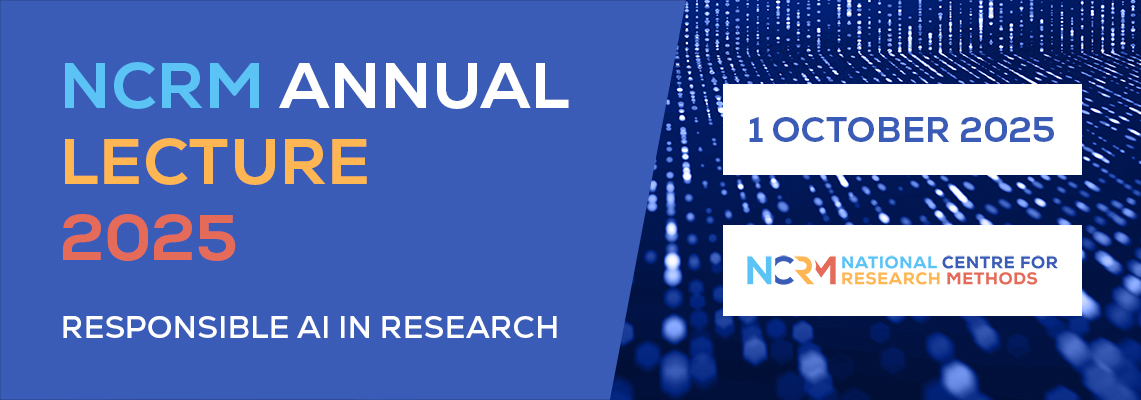
NCRM Annual Lecture 2025
The NCRM Annual Lecture 2025 explored the topic of responsible AI in research. The free event took place on Wednesday, 1 October 2025 at The British Academy in London and was streamed online. Four panellists offered expert insight on this crucial topic and answered questions from the audience.
Watch highlights of the eventAbout the event
AI is everywhere, affecting everything: our jobs, public services, the media, the way companies do business, the way governments are run, the way we conduct our research.
Changes seem to be continuing. Impacts seem to be increasing. AI is in the news every day as somebody builds a new bot to do some everyday task, or a tech company upgrades its software to a new version with new features and capabilities.
Meanwhile, increasingly important questions are being raised about how researchers can develop, deploy and use AI responsibly. And given the talk about AI agency, what does responsible AI even mean?
The NCRM Annual Lecture 2025 brought together four experts on AI with different perspectives. The panel discussed AI futures and ethics, and what this all means for education and research.
Panellists
Dame Wendy Hall, DBE, FRS, FREng is Regius Professor of Computer Science, Associate Vice President (International Engagement) and is Director of the Web Science Institute at the University of Southampton. She became a Dame Commander of the British Empire in the 2009 UK New Year's Honours list and is a Fellow of the Royal Society, the Royal Academy of Engineering and the ACM. Dame Wendy was co-Chair of the UK government’s AI Review, which was published in October 2017 and a member of the AI Council. She is currently the co-Chair of the ACM Publications Board and Editor-in-Chief of Royal Society Open Science. She is an advisor to the UK government and many other governments and companies around the world and in 2023 was appointed to the United Nations high-level advisory body on artificial intelligence. Her latest book, Four Internets, co-written with Kieron O’Hara, was published by OUP in 2021. www.damewendydbe.com
Professor David De Roure, of the University of Oxford, is Academic Director of the Digital Scholarship @ Oxford initiative, Academic Director of the Laboratory for AI Security Research and Professor of e-Research in the Oxford e-Research Centre. His research focuses on new methods of digital scholarship, innovation in knowledge infrastructure, cybersecurity and music. He was closely involved in the UK e-Science programme where he was the National Strategic Director for Digital Social Research for the Economic and Social Research Council.
Dr Zeba Khanam received her PhD in Computing and Electronic Systems from the University of Essex in 2022, where she was awarded the Embedded and Intelligent Systems Scholarship. She currently serves as a Cybersecurity Research Manager in BT's Security Research Group. Her research centres on two key areas: using AI to tackle cybersecurity challenges such as threat intelligence information overload and exploring how AI can be weaponised by threat actors to conduct malicious activities. Her work has earned multiple awards and attracted additional grant funding.
Dr Mark Carrigan FRSA FHEA is a Senior Lecturer in Education at The University of Manchester, where he co-leads the Digital Education Manchester group and serves as an AI Fellow at the Institute for Teaching and Learning. Trained as a philosopher and sociologist, his research bridges fundamental questions of social ontology with practical and policy interventions to support the effective use of emerging technologies in education. He has written or edited ten books, including Social Media for Academics (Sage, 2nd edition) and Generative AI for Academics (Sage, 2024). His forthcoming book, Platform and Agency: Becoming Who We Are (Routledge, 2025), develops a conceptual framework for understanding personal transformation in the digital age.

